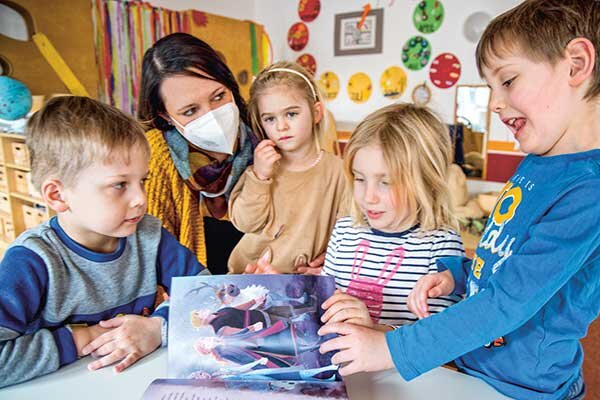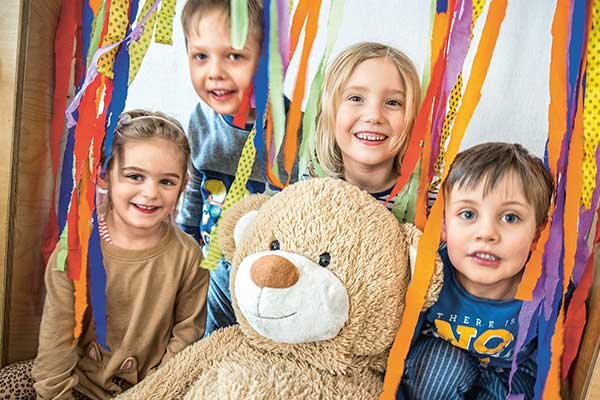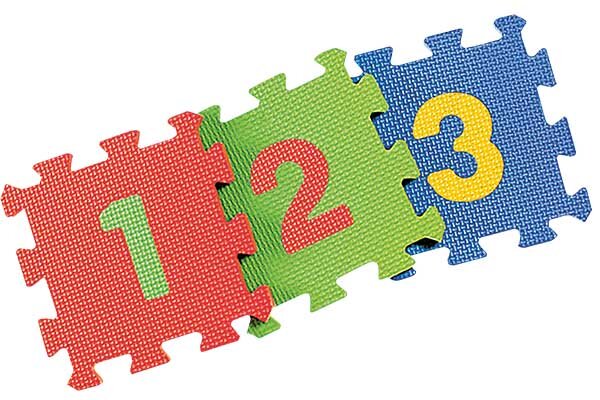Through the crisis with creativity
One of 61,000 everyday professionals

Janina Spieß from the KulturKindergarten facility in Wetzlar
“My daily routine has changed completely,“ says Janina Spieß. After eight years as a kindergarten educator, the 34-year-old took on the position of head of the
childcare facility at the Lahn-Dill-Kliniken in Wetzlar. She is now responsible for the care of 60 children and the supervision of 21 employees. The pandemic has made the job more complex; she must comply with regulations, establish hygiene plans and „with each new government requirement, we are confronted with new issues“.
Work-life balance
At the bilingual Dussmann KulturKindergarten facility at the Lahn-Dill clinics in Wetzlar, children ask questions. “Will corona make us all ill?” asks a four-year-old. “It’s important to take questions like this seriously. Due to the medical background of parents, they see and hear a great deal,” elucidates center manager, Janina Spieß. Her office door is always open and she likes it when children visit her. “I can’t imagine the daily routine without children,” she reflects."
Janina Spieß was one of our original educators,” reveals Dr. Ute Meltzer, managing director of the now eight KulturKindergarten facilities operated by the Dussmann Group for partner companies. The facility in Wetzlar was one of the first two faci-ities, which were opened back in 2011.
Dussmann is a full-service partner; we take on all of the necessary tasks to establish in-house corporate childcare. The Dussmann KulturKindergarten concept helps parents to balance work and family life and that in turn helps companies attract and retain skilled workers.
In addition to proximity to the workplace, long, flexible opening hours are a cornerstone of the concept. Flexible drop-off and pick-up times from 6 a.m. to 8 p.m., and on weekends, if required, enable parents to arrange care to fit their schedules. Single parents working shifts have a problem in many "normal" daycare centers, but not at the KulturKindergarten facilities.
“My mum fights corona; she works here at the hospital” exclaims a doctor’s five-year-old son. During lockdown, the nursery set up emergency care for doctors and nurses. After that, parents helped to reduce group sizes by bringing their children only during duty hours. “When fewer children are here, some educators work from home,” explains Janina Spieß. At home, they can work on documentation and prepare projects. “Working from home is new to many of us in this profession,” she laughs.

Strengthen children’s perception
Arts-related project work and activities are important components of the Dussmann Kindergarten concept. It often involves visits to museums. "At the moment, art is primarily a do-it-yourself activity," says Janina Spieß. Strengthening children‘s perception, familiarizing them with different techniques, all this is unchanged. „We work with a wide variety of materials. In winter, we painted with colored snow,“ she recounts. The multi-group project „toy-free time“ unleashed creative potential. For several weeks, the children left the traditional toys in the cupboard and instead, made their own from everyday materials, for example a marble run or props for role play. The next project will be a nature project and it will take place on the huge outdoor area.
The facility cooperates with the music school in Wetzlar. Before the pandemic, a music teacher came each week to give early childhood musical education but at the moment, music is taught with the materials available. Singing must be avoided, so the children do rhythm exercises and learn about instruments.
In the morning circle, educators share fingerplays and rhymes. In English too, because a bilingual approach is a further focus of the Dussmann KulturKindergarten concept. There are English native speakers in the educator team who speak exclusively English with the children, according to the immersion method. The center manager describes how the children’s listening abilities develop: “When our English speakers ask a question in English, the answer is usually in German, but it’s the right answer”.
English is not the only foreign language for many; quite a few children do not speak German at home and have other cultural backgrounds. „We live diversity,” emphasizes Janina Spieß. Contact with other values and customs, for example by celebrating festivals, teaches children to learn to live together with respect and tolerance.
Janina Spieß looks forward to the time when they can include parents in such events, hopefully in the summer of 2021, when the Dussmann KulturKindergärten celebrates its tenth anniversary.
